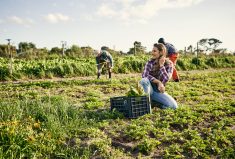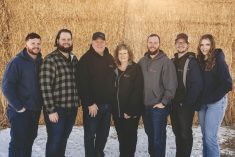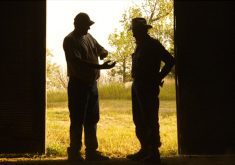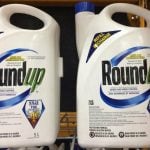We are living in the Information Age. We’ve created more information in the past few years than in all of human history, says neuroscientist Dr. Daniel Levitin in his book, A Field Guide to Lies: Critical Thinking in the Information Age.
In theory, the internet puts all this great material at our fingertips, but the truth is that we have never been fed so much that is fake, false or misleading.
Simply put, it’s more difficult than ever to separate what you should believe from what you should reject.
Read Also

‘No agenda, no attenda’: How to professionalize your family farm meetings
Establishing meeting ground rules can help a farm family find ways to communicate that work for the business and the family.
Country Guide reached out to Levitin and others involved in teaching information literacy for tips on how to be a discerning consumer of information. After all, scientific studies have proven that, thanks to the way we use social media, false information spreads faster and further than the truth, so the stakes have never been higher.
Levitin, who teaches critical thinking at McGill University, doesn’t hold back. He calls internet literacy the single most important issue facing our society. “A great number of the problems that we are facing will all dissolve if we can do something about this as a society. And I think that that something is education in critical thinking and information literacy and internet literacy.”
The way our brains work also makes us more prone to drawing the wrong conclusions. They didn’t evolve in a technological society so we aren’t very good at detecting patterns in statistics or applying logic to complex cases, says Levitin.
We are also prone to suffering from what psychologists call confirmation bias, the tendency to embrace data that confirms our views while ignoring or rejecting information that doesn’t support our pre-existing opinions or beliefs.
Heather Woodley, supervisor of technical services at the Region of Waterloo Library near Waterloo, Ont., says it’s important to be an informed consumer when it comes to information on the internet. “Anybody can write anything they want online.”
The internet makes it easy and inexpensive for anyone to publish information and make it look legitimate and appealing, so we need to think especially critically about what we read, see and hear online.
Given that three-quarters of Canadians get their news from the internet, the importance of being an informed consumer is clear. There are several steps we can take to help us evaluate the legitimacy of information.
Get aggressive
First, Levitin recommends considering the source of the information. Is it a reliable source or is it biased? If it comes from a growers’ organization, they may have a vested interest and it might be biased, says Levitin. “You wouldn’t believe the reports of a drug company over Health Canada which is neutral,” he says by way of example.
Woodley, who gives workshops on spotting fake news for library patrons, uses a mental checklist when reading information online. Why does it exist? Is it for information purposes or are they trying to sell me something? What’s the motive behind the information? What is the authority of the person making the claim?
For example, for medical information, are they a trained medical professional? Are their credentials relevant to the subject matter being presented?
When possible, Levitin recommends taking the word of an expert (although not blindly) over someone who is not an expert. For example, if you hear about dietary supplements that are reported to extend your life, look to see if any of those reports are from medical researchers, he advises.
Next, Levitin says you should ask yourself if there is some missing information. Are you only seeing part of the story? Farmers are already good at evaluating product claims. If a company promotes test results that show a new product led to a yield increase, growers will start asking questions about other variables, such as weather, different seed, etc.
Now, farmers need to be equally aggressive with what they see online.
When looking at information online, Woodley recommends checking to see if it is current. With new research becoming available every day, information becomes outdated. “Information changes,” explains Woodley. It may have been reliable and credible at the time but may no longer be valid. Old information often doesn’t get taken off the internet, she says.
A Canadian solution
To help create a citizenry that is digitally literate, the non-profit, non-partisan registered charity CIVIX has teamed up with the Canadian Journalism Foundation to deliver the NewsWise program in Canadian schools. With funding from Google, a series of videos, interactive tools, and other resources has been made available to teachers for classroom use.
With evidence that fake news has had an impact on past elections, digital literacy is critical. According to the NewsWise website, “Digital literacy is one of the most pressing issues facing democracies. Being able to determine what is fact or fiction online has become an essential skill of citizenship in the digital age.”
Jessica Johnston, a journalist and manager of News Literacy Programming at NewsWise, says determining if information is credible on the internet, especially with social media, is a problem we all face. While no person, organization or publication is immune to making errors, some sources are more credible than others. Newspapers that follow professional journalistic standards of fact checking, accountability, and issuing corrections, set themselves apart from those that do not, says Johnston.
Wikipedia can be a good place to start to find background information on a source or publication. How long has it been around? What is its circulation? These are what Johnston refers to as credibility signals.
Johnston recommends thinking like a fact checker and getting as close as possible to the original reporting source. “The closer you can get to the source, the better you will be able to evaluate the authority of the source and the validity of the information.”
Checking to see if the claims can be verified through other sources is another way to confirm the accuracy, adds Woodley. While opinions are fine, it is important to differentiate between opinion and fact.
According to the NewsWise website, there is no single path to assessing the credibility of information online. Each case will be different. “The important thing is to understand the importance of accuracy, and to know how to assess it. A verification mindset is one of critical thinking and healthy skepticism.”
Levitin agrees. “Critical thinking isn’t something you do once in a while… It’s something you have to do every day, and you have to remind yourself to do it.”
Resources
- A Field Guide to Lies: Critical Thinking in the Information Age, a book by Dr. Daniel Levitin, (recently reprinted with the title, Weaponized Lies: How to Think Critically in the Post-Truth Era), teaches how to think critically and evaluate information so you can recognize misleading statistics, graphs, news stories, etc.
- For health information, look for the Health on the Net logo. Health on the Net is a non-profit organization with a relationship to the World Health Organization. The logo indicates information that has been deemed to be reliable and transparent.
- FactsCan is an independent and non-partisan fact checker on Canadian federal politics. It is a registered non-profit organization.
- Politifact is a not-for-profit U.S. journalism fact checker.
- Snopes.com is an independent website that has been fact-checking information on the internet since 1994.
- Use tools like Google Scholar to find peer-reviewed scientific papers or Google Images “reverse lookup” to find the origins of a photograph and determine its authenticity.
- NewsWise, a program delivered by CIVIX and the Canadian Journalism Foundation, with the support of Google Canada, provides teachers with resources and tools to help school-aged children find and filter accurate information online.
- This YouTube video ‘Why your newsfeed sucks‘ explains the fact-checking process.
















